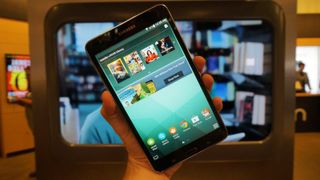All about the Nook-y: is Samsung's ereader tieup enough to stop Amazon?
Read all about the newest ereader war

Barnes & Noble is struggling, but it has a plan to rescue its book selling, ereader making, occasional tablet producing business. It wants to associate itself with smart-thing behemoth Samsung, in an attempt to win some kind of leverage over Amazon in the battle for the digital book market.
The result? Samsung's Galaxy Tab 4 Nook, a Samsung tablet with a couple of token Nook apps pre-loaded on it and a widget to show off the owner's digital library.
The cynical audience member might suggest this is an opportunity for Samsung to further flog its low-end tablets to those who don't read and compare spec sheets for three months before buying their gadgets. Plus it benefits the Nook brand by associating it with something more popular than the largely ignored Nook HD tablets.
But who wants to read a book on a tablet? And why would you read a book on a tablet, when tablets come with access to much more interesting 21st century entertainment activities, like watching TV and looking at videos of celebrities having buckets of cold water chucked over them?
Dedication is what you need
On The Register, reader Yet Another Anonymous Coward summarised the pros and cons of the tablet-versus-reader market. The end result was: "Dedicated ebook tablet = expensive, don't already own one, poor battery, don't always carry it, can't read in sunlight. Why am I buying this?"
Dunno, brand loyalty to Samsung? A present for a child? Perhaps ereader tablets might take off in the same way home computers did in the 1980s, by promising to deliver serious schooling activities (look! It has books!) but actually being used for nothing other than games once through the (bedroom) door?
In reply, reader Stanislaw says the problems faced by the Nook series isn't to do with B&N's hardware, but is more of an issue with its software implementation.
Get daily insight, inspiration and deals in your inbox
Get the hottest deals available in your inbox plus news, reviews, opinion, analysis and more from the TechRadar team.
He posted: "Seems to me that B&N have misunderstood the problem entirely. The old tablets were fine, really - and the ereaders were excellent. Nope, the real problem is B&N's woeful attempt at an online store. To say it's clunky would be being rude to clunky things. It's slow, it's ugly, and when you finally give up and go to Google Books or the Kindle store you realise just how poor B&N's is by comparison."
Reader Gray has also been scarred by the B&N book buying process, explaining: "Comparing the B&N site to Amazon's is like comparing a Trabant [regarded with derisive affection as a symbol of the extinct former East Germany - Wikipedia] to a Mercedes. Yeah, you (may) eventually get somewhere, but afterward you'll push the Trabant off a cliff lest you ever be tempted to use it again."
Man in format-agnostic shock
On the ZDNet comments bit, reader MichaelInMa thinks it might be nothing more than a way for Samsung to clear out a bit of warehouse space ahead of the launch of another batch of 50 different Android models, suggesting: "Maybe Samsung found a way to dump a lot [of] tablets. Reading how well they are doing lately in the world market I will bet they had a lot of left over Wi-Fi only tablets they need to get rid of."
There are books everywhere in every shop you go in. People must really hate books.
Commenter MajorlyCool is happy, though, as he likes to flip-flop between providers and doesn't seem to have received the memo saying you have to choose one format and hate all the rest for ever more, posting: "I'm happy to see B&N still in the fight. Competition is a good thing and with this tablet you have the freedom to install apps from Google Play, including the Kindle app. That's been a sticking point for me as I have books from both companies."
